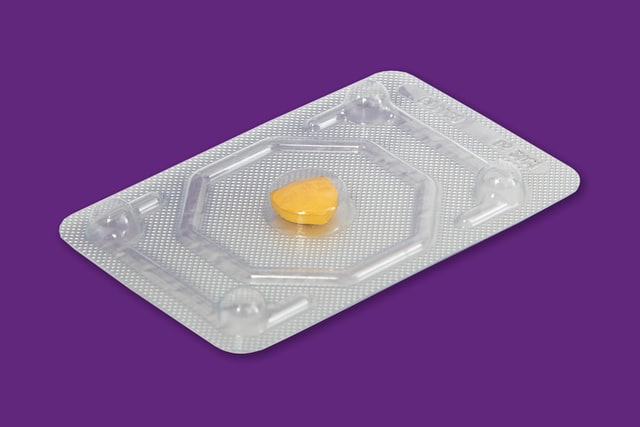Oral contraceptive pills, or birth control pills are effective contraceptive methods to prevent pregnancy. However, there are several types from which to choose from, and with so many options it may be hard to decide which is the best one for you.
We discuss the different options available here and they might (or might not) be suitable for you.
This article is part of a comprehensive set of articles on Contraceptive Pills.

Types of oral contraceptive pills
There are two types of oral contraceptive pills:
1. Combination pills
Combination oral contraceptive pills consist of two hormones: estrogen and progestin (a form of progesterone). Conventional combination pills follow a standard dosing schedule using active and inactive pills. Active pills contain hormones while inactive pills do not contain hormones.
Combination pills can be further categorized as follows:
- Monophasic pills, which are used in one-month cycles. Each active pill provides the same amount of hormones. Inactive pills are taken during the last week of your cycle so that you have your period.
- Multiphasic pills, which are also used in one-month cycles. However, the level of hormones provided by the active pills during the cycle is different. Inactive pills are taken during the last week so that you can have your period.
- Extended cycle pills are used to create longer cycles. They are designed to be taken for a longer time, with 12 weeks of active pills followed by a week of inactive pills. With the extended cycle pill, you will only have your period three or four times a year.
Combination pills brand names
Brand names of combination pills include:
- Alesse
- Apri
- Aranelle
- Aviane
- Azurette
- Beyaz
- Enpresse
- Estrostep Fe
- Kariva
- Levlen
- Levlite
- Levora
- Loestrin
- Mircette
- Natazia
- Nordette
- Ocella
- Lo Ovral
- Low-Ogestrel
- Ortho-Novum
- Ortho Tri-Cyclen
- Seasonale
- Seasonique
- Velivet
- Yasmin
- Yaz
- Microgynon
2. Progestin-only pills (minipill)
As the name suggests, progestin-only pills contain only progestin and do not have estrogen in them. They are also referred to as the ‘minipill’. All pills are active with progestin-only pills and because there are no inactive pills, your period may or may not be present.
Progestin-only pills are a good option for women who are unable to take estrogen due to health issues. Women who require progestin only pills are advised to speak to a medical professional/gynaecologist in-person as there are other long term alternatives such as a depo injection lasting 3 months, or even an implanon or intrauterine device that can provide birth control for 3 years or more respectively.
Progestin-only pills brand-names
Brand names of progestin-only pills include:
- Camila
- Errin
- Heather
- Jencycla
- Nor-QD
- Ortho Micronor
- Ovrette
How do oral contraceptive pills work?
Combination pills work to prevent pregnancies in 3 main ways.
First, they prevent ovulation from occurring by stopping your ovaries from releasing an egg each month.
Secondly, combination pills will also cause your cervical mucus to thicken. Cervical mucus is present to help sperm travel to the uterus to fertilize a woman’s egg. Thickened mucus makes it hard for sperm to reach the uterus to fertilize the egg, if, for some reason, ovulation took place.
Thirdly, they cause the thinning of the endometrium or uterus lining. A woman’s egg implants on the endometrium once it’s fertilized by a man’s sperm. The thinner lining makes it harder for implantation to occur and this prevents the pregnancy from moving on to the next stage.
Progestin-only pills also work by thickening the cervical mucus and thinning the endometrium, or the uterus lining. However, they do not prevent ovulation as consistently as combination pills do.

Pros and cons of combination pills
As will all contraceptives, there are advantages and disadvantages to taking combination pills.
Pros
- It is a birth control method that is easily reversible when you want to conceive.
- It helps reduce premenstrual syndrome (PMS) symptoms.
- Helps relieve menstrual cramps.
- Periods are lighter, shorter and more predictable.
- Helps to reduce heavy bleeding related to anaemia.
- Helps with acne for clearer skin.
- Lowers ovarian and colorectal cancer risks.
- Reduces endometriosis symptoms.
- Increases bone mineral density.
- Reduces unwanted hair growth for women with PCOS.
Cons
- The effectiveness of this contraceptive method may be reduced if pills are skipped or not taken on time.
- It does not protect against sexually transmitted infections such as HIV.
- It may increase the risk of high cholesterol, stroke and heart attack.
- There is an increased risk of blood clots. This is especially so for women who are over 35 and women who smoke.
- There seems to be an increased risk of cervical and breast cancer. However, the risk declines slowly once you’re off the pill.
- Common side effects such as breast tenderness, headache, irregular bleeding, bloating, nausea, and weight gain.
Pros and cons of progestin-only pills
Here are some advantages and disadvantages of progestin-only pills that should be considered:
Pros
- It is easily reversible when you intend to conceive.
- More suitable if you are at risk of blood clots, heart disease, high blood pressure and migraines.
- Compared to combination pills, progestin-only pills are less likely to interfere with breastfeeding.
- Lowers the risk of endometrial cancer.
Cons
- It MUST be taken at the same time every day. Backup birth control methods (Eg. Condoms) need to be used for at least 2 days if you are more than 3 hours late in taking the pill or if you accidentally skip a pill.
- Does not protect against STIs.
- A slightly higher risk of ectopic pregnancy is you do conceive when you are on this type of pill.
- Common side effects such as irregular bleeding, decreased libido, breast tenderness, headaches, ovarian cysts, hirsutism, weight gain and depression.
For more information on oral contraceptives side effects, read ‘Side Effects and Risks of Contraceptive Pills – Explained’
Which is the most effective oral contraceptive pill?
Both pill types are cited to be 93% effective with typical use and 99.5% effective when used perfectly. This means that 7 out of 100 women who are using the pill will get pregnant.
Progestin-only pills need to be taken within the same 3-hour period consistently every day to keep hormone levels from fluctuating in order for it to be fully effective.
Combination pills allow for more flexibility as it provides protection against pregnancy when you take it within the same 12-hour time frame daily. Because of this, progestin-only pills have a higher failure rate compared to combination pills.
The following medications can also render oral contraceptive pills less effective:
- Certain HIV medications (lopinavir and saquinavir)
- Certain anti-seizure medication (carbamazepine and topiramate)
- Certain antibiotics (rifampin)
- St John’s wort
Diarrhea and vomiting can also cause the pill to be less effective than usual. To avoid pregnancy, a backup contraception method might be needed. Emergency contraceptive pills are also available if you forgot to take your regular pills and had unprotected sex, although they should not be used frequently.

Which type of birth control pill is better for you?
This depends on your medical history as well as any current medications you are on. As such, the combination pill may not be suitable for you if you:
- Are over 35
- Smoke
- Have just given birth
- Have high blood pressure that is not properly managed
- Have blood clotting issues
- Have a history of heart disease or stroke
- Have a history of breast cancer
- Have a history of pulmonary embolism or deep vein thrombosis
- Have a history of migraines with aura
- Have gallbladder or liver disease
- Have complications related to diabetes
- Have uterine bleeding
- Will be having major surgery that causes you to be immobilized for a long period of time
- Are on certain medications such as anti-tuberculous agents or anticonvulsants
Conversely, the progestin-only pill might not be suitable for you if you:
- Suffer from liver diseases
- Have breast cancer
- Have uterine bleeding
- Are on certain medications such as anti-tuberculous agents or anticonvulsants
As such, it is important that you seek advice from a medical professional before you start on any oral contraceptives to ensure that you are on the type of pill that is best for you.
Oral contraceptive pills in Singapore
Oral contraceptive pills are a popular birth control method in Singapore. They are available at pharmacies with a sign-off from a medical professional.
You can also purchase them at Ova, a direct telemedicine provider recognized by Singapore’s Ministry of Health. All you need to do to have birth control pills delivered right to your doorstep is fill in a questionnaire, and speak to our team of medical professionals online.
Conclusion
Oral contraceptive pills are a popular choice among women who do not want to get pregnant. They are also sometimes used to help improve acne and reduce PCOS symptoms. Whatever the reason you’re considering oral contraceptives, always speak to a medical professional before consuming them.